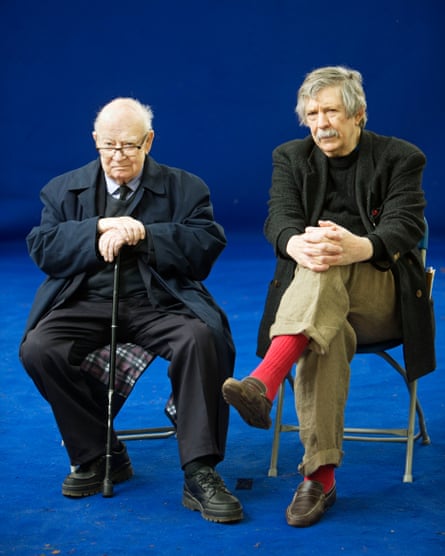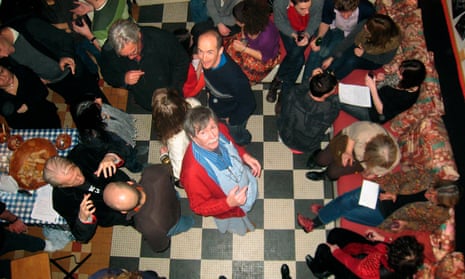Jim Haynes, who has died aged 87, was someone who made extraordinary things happen. In Edinburgh in the late 1950s, he founded Britain’s first paperback bookshop – not just a shop but a “salon”, as he put it, where people could arrange to meet, have coffee, or just chat with the voluble, ever-welcoming proprietor. The Paperback Bookshop also produced plays, and in 1962 Haynes was instrumental in founding the Traverse theatre. At the same time, in collaboration with the publisher John Calder, he organised the first Edinburgh international book festivals, with Henry Miller, Norman Mailer, Mary McCarthy and William Burroughs, among others.
The success of these enterprises – as well as of his Arts Lab space in London later in the decade – coincided with the mounting opposition to censorship in the arts. It was possible to buy Lady Chatterley’s Lover in the Paperback Bookshop before the Old Bailey trial which cleared the way for its general sale. Later on, Haynes became a more forthright champion of sexual liberation, helping to set up the magazine Suck in Amsterdam in 1969 (“the one thing I regret is that we never had a cover with a naked Jean Shrimpton on it”) and the Wet Dream film festival in 1971.
He was born in Haynesville, Louisiana, the only son of comfortably off middle-class parents Mary Ann (nee Almand) and James Haynes. His father worked in the oil industry, and the family moved to Venezuela when Jim was 13. On graduation from high school, he enrolled in the US military, a move he immediately regretted, and which was to restrict his freedom-seeking spirit for a decade, but which also brought him to the air force base at Kirknewton, near Edinburgh. He was given leave to study at the university and in 1959 requested and was granted demob.
His father was a drinker – by his 40s, Jim had sworn off drugs, alcohol, tobacco and even coffee – who nonetheless taught his son a lesson that dominated Jim’s life: “When you do something nice for somebody, forget it immediately. When someone does something nice for you, never forget it.” This led to tolerance of all kinds of people – one of Haynes’s books (with Jeanne Pasle-Green) was called Hello, I Love You (1974). He claimed that his ambition was to have everyone in the world in his address book.
In the mid-60s, having been forced out of the Traverse by financial difficulties and internal squabbling, he moved to London and began seeking a “space”, where people could gather and make things happen. “One of the nice things about being in a theatre which is open to new ideas”, he wrote in his engaging memoir Thanks for Coming! (1984), “is that you meet lots of people. Anyone who had a new idea was told, ‘See Jim Haynes, you can do it there’; and they were usually right.”

As Charles Marowitz, the theatre director who collaborated with Haynes on projects at the Traverse, put it, “Jim Haynes acts on the assumption that everyone’s say is as valid as everyone else’s”. In a contribution to Thanks for Coming!, Marowitz added: “I regret loathing Jim in those early years.”
At the Arts Lab, a blackboard stood at the entrance with a menu of the evening’s events, often organised spontaneously: experimental films, poetry readings, exhibitions, outlandish performances by Yoko Ono and others. In the spirit of the times, “Donovan came in one night saying he was going to give a concert”. In the downstairs cinema, everyone reclined on foam rubber, making for “intimate viewing”. At the Traverse, Haynes had had the delightful idea of having no seats in the auditorium, asking patrons to pick up a portable chair on the way in. “Full house every night.”
The house journal of the Arts Lab was International Times, of which Haynes was also a founder member, though associates such as Barry Miles and Tom McGrath had a deeper involvement.
The forms of sexual liberation pursued by Haynes and others appear thoroughly old-fashioned now. Scarcely anyone spoke of misogyny, the persistence of jealousy, sexual exploitation, or harassment. Disease was reckoned a minor inconvenience, to be cleared up by a trip to the clinic. In a letter to Haynes, dated October 1972 and headed “Why I Resigned from Suck”, Germaine Greer explained her motives for breaking with the magazine and the entire Haynes enterprise. A picture of Greer in the nude had appeared without her permission. “Dear Jim: I said I would give you a nude picture when you had a nude picture of Jean Shrimpton among the other members of the editorial board. You then claimed to have a nude picture of Jean, which was a minute depiction of Jean as Heathcote Williams’s penis which was entirely unrecognisable.” Greer added that she was not ashamed to have been associated with Suck in the past, but “I think I’d have to be a raving maniac to associate with Suck in the future”.
In 1969, Haynes moved to Paris to take up a one-year visiting teaching post at the experimental University of Paris VIII. He spoke no French at the time and knew nothing about teaching, except, as he put it, “in my own career in school I did better in those subjects where I was in love with the teacher”. The job turned into a permanent appointment, but a leisurely one. Meanwhile, Haynes continued his usual “let’s do it” cultural work.
When the poet Ted Joans was due to give a reading in Paris one evening in 1979, he found himself without copies of his books to sell after the event. Haynes put together a “book” using duplicator and stapler – the first of many publications under the name of Handshake Editions. “I called the imprint that because the contract with the author is a handshake.”
Under this and other home-based imprints, he issued several of his own books, including Everything Is! (1980) and Workers of the World, Unite and Stop Working! (1978). Both were translated into several languages, usually under other living-room imprints. Among many friendly postcards from his Paris neighbour Samuel Beckett, Haynes treasured one that read: “Many thanks for Hello, Je t’aime”. Other projects included the audio magazine Cassette Gazette – when cassette tapes were at the cutting edge – and a collage film about Marlene Dietrich which fell foul of copyright legislation. Haynes always seemed surprised to discover that such matters could not be settled with a handshake.
This insouciance had deeply unpleasant consequences in the early 1990s, when Haynes walked blindly into a ruinous entanglement with a Paris-based South American lawyer, leading to numerous court appearances, huge expense, and the loss of a property in the same row as his main atelier, which had been bought with an inheritance. The case dogged him until the end.
Happier times at Atelier 2, at 83 rue de la Tombe-Issoire, were when a dozen or more people were assembled in the main room, mostly new to one another, often on the point of forging lasting friendships. At “Jim’s place”, as it was universally known, you might meet a Greek terrorist, a Buddhist call girl who was writing short stories, Polish dissidents, the comedian Dick Gregory, the writer Kathy Acker, or a theatre director whose new play involved a bare stage and no characters. Haynes suffered them all gladly, always willing to do “something nice” for each, seldom holding ingrates to account.
Back in the days of the Traverse, two journalists arranged for him to have lunch with the conservative campaigner Mary Whitehouse, hoping for explosive reactions. They were disappointed. She and Haynes agreed there was far too much violence on television. “I thought she was a very nice woman”, he said. “We had a delightful lunch together.”
In 1961, he married Viveka Reuterskiöld, a Swedish woman he met while she was working as an au pair in Edinburgh. The marriage was short-lived. Their son, Jesper, and granddaugher, Ina, survive him.
James Almand Haynes, writer, theatre director and impresario, born 10 November 1933; died 6 January 2021

Comments (…)
Sign in or create your Guardian account to join the discussion